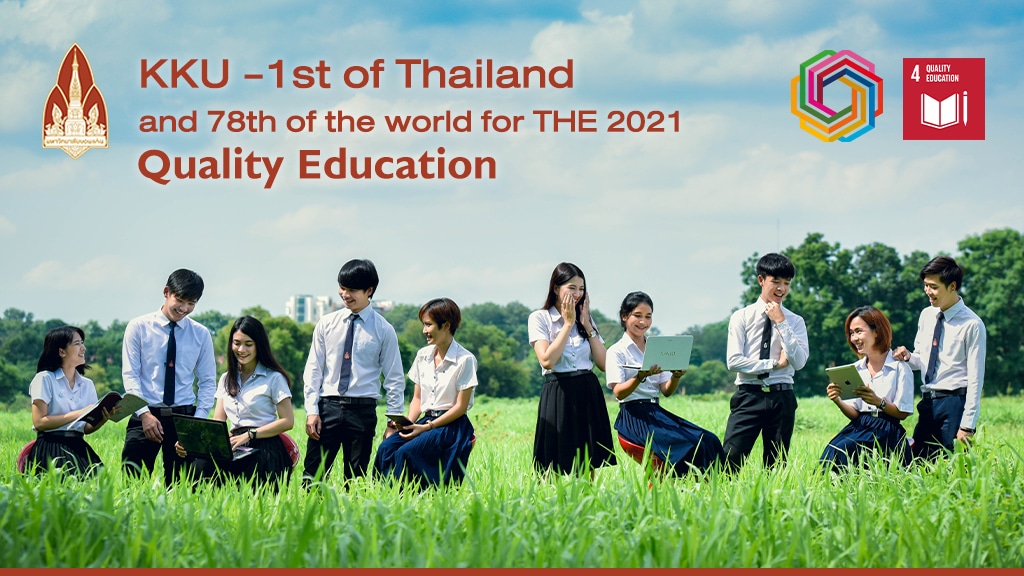“Times Higher Education” or “THE”, the world leading university ranking institution in England announced the “THE Impact Rankings 2021”, which came from the evaluation of 1,115 universities from 94 countries all over the world, based on the United Nation’s 17 Sustainable Development Goals (SDGs). It is the great pride that Khon Kaen University is ranked the first among Thai universities and the 78th of the world in SDGs 4 Quality Education – the instructional quality and equal access to education, scoring 72.7 out of 100. Khon Kaen University holds this top rank in the country for the third year in a row!

Asst. Prof. Tala Thammaroj, M.D., Vice President for Administration of Khon Kaen University revealed the details of THE Impact Rankings 2021 that the evaluation of the world leading university ranking institute is based on the United Nation’s 17 Sustainable Development Goals (SDGs). Four items a university scores the highest were selected for the ranking.
“Up to now, each university is outstanding and scores in each item differently. This year, Khon Kaen University is at the 201–300 places from 1,115 universities all over the world that submitted the work outcomes for evaluation. Khon Kaen University is outstanding in 4 aspects out of the United Nation’s 17 Sustainable Development Goals (SDGs), namely, SDG 1: no poverty, SDG 3: good health and well-being, SDG 17: partnerships for the goals, and SDG 4: education equality, which we stay the first for 3 consecutive years,” said the Administration Vice President.

Khon Kaen University ranks the first in Thailand and the 78th of the world in SDGs 4 Quality Education, scoring 72.7 / 100.
The Vice President for Administration said that there are 3 dimensions making us rank the first in SDGs 4 Quality Education: Dimension 1: research in education, Dimension 2: student support and program qualities, and Dimension 3: curriculum revision that meets with the sustainable development of the United Nation.

“Our research outcomes partly make the score relatively high, for we have a lot of research studies that aimed at supporting the communities. Besides, we support the students by giving scholarships. Many of our students are from the Northeast and are from poor families. This makes the proportion of poor students the highest in the country. Moreover, the tuition fees of Khon Kaen University are relatively lower than other universities, that is, 12,000 to 18,000 baht per semester. This is the indirect way that we support the young people to have access to higher education, and it becomes the strength that makes us score high. As for curriculum development, we have revised the programs to meet with the sustainable development goals, for example, the environmental engineering program, clean energy program, etc. We have also driven all programs to support the solving of community problems. Our university encourages students to perform field research, support communities, or conduct community research, because many areas face the problems of poverty and unemployment. Therefore, the various programs of KKU are connected to field work,” Asst. Prof. Tala Thammaroj said.

In addition, Asst. Prof. Tala added that holding this first rank for 3 years in SDGs 4 Quality Education follows the University’s 4th Strategy on Academic Service Transformation, which emphasizes connection of KKU’s bodies of knowledge with the communities in order to build sustainability, and the new bodies of knowledge are truly associated with community problems.

“This first place in THE Impact Rankings in 2019, 2020 and in SDGs 4 Quality Education consecutively for 3 years from 2019 to 2021 is our motivation and confirms that the University’s instructional process that links with the communities and that takes into account the communities’ problems as the research issues or topics reflects that we are on the right path, for the world accepts this. It demonstrates that the strength of Khon Kaen University is in instruction and community services. We will continue to work on this strategy.”

“For the next year’s goal, we plan to look at all SDGs and consider which of the SDGs we still have to work out or we have not had enough projects to work on, for example, SDG 6: clean water and sanitation, SDG 7: affordable and clean energy, SDG 8: decent work and economic growth, SDG 9: industry, innovation, and infrastructure. We may have to place the importance on the said SDGs, but will continue to improve the former SDGs. There may have to be some learning and sharing in other aspects that other universities are good at, for collective sustainable development.” Asst. Prof. Tala Thammaroj ended.
The United Nation’s 17 Sustainable Development Goals (SDGs) are: SDG 1: no poverty, SDG 2: zero hunger, SDG 3: good health and well-being, SDG 4: education quality, SDG 5: gender equality, SDG 6: clean water and sanitation, SDG 7: affordable and clean energy, SDG 8: decent work and economic growth, SDG 9: industry, innovation and infrastructure, SDG 10: reduced inequalities, SDG 11: sustainable cities and communities, SDG 12: responsible consumption and production, SDG 13: climate action, SDG 14: life below water, SDG 15: life on land, SDG 16: peace, justice, and strong institutions, and SDG 17: partnerships for the goals






















